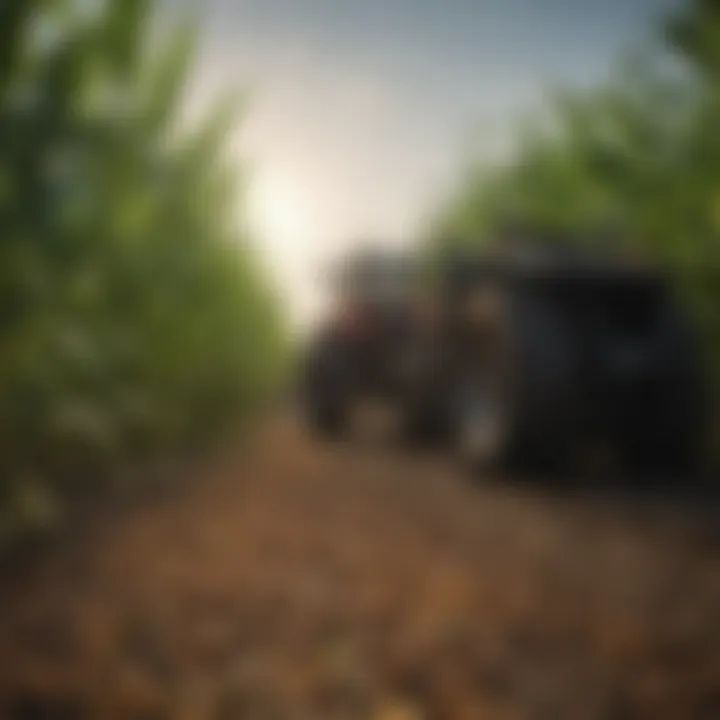Impact of Organic Fertilizers on Corn Farming Practices


Intro
The significance of organic fertilizers in agriculture, particularly in corn cultivation, cannot be overstated. With the increasing need for sustainable farming practices, these fertilizers have gained attention for their multifaceted benefits. Not only do they enhance soil health, but they also contribute to improved crop yields, marking a shift towards environmentally friendly agricultural methods.
In many corners of the globe, the demands of food production have reached a fever pitch. Farmers and researchers alike are constantly searching for methods that not only produce more food but do so in a way that respects the earth. Organic fertilizers present a viable solution by replenishing nutrients, enhancing soil structure, and fostering a biodiversity of soil life that chemical fertilizers often inhibit. As such, the spotlight on these natural amendments highlights their role in aligning farming practices with ecological stability.
Corn, as a staple crop, stands at the forefront of this conversation. Its growth and yield are pivotal to various industries, from food production to biofuels. So, the question arises: How do organic fertilizers step into the limelight, driving the future of corn cultivation?
This article sets out to examine this very question, delving into the types of organic fertilizers available, their practical applications, and their ecological impacts. Along the way, we'll uncover the nuances of integrating these fertilizers into standard farming protocols, allowing farmers to take a balanced approach that supports both productivity and environmental stewardship.
Prologue to Organic Fertilizer
To understand the impact and relevance of organic fertilizer in corn cultivation, one must first grasp what organic fertilizers are and where they fit within agricultural practices. With the global push towards sustainable farming and the need to maintain soil health, organic fertilizers are taking center stage. This introduction provides a contextual base for discussing their role specifically in corn farming.
Definition and Importance
Organic fertilizers are derived from natural sources and are composed of materials that come from plants and animals. Unlike synthetic fertilizers, these organic variants enrich the soil in a manner that’s more aligned with natural ecosystems. They not only provide essential nutrients but also improve soil structure, enhance water retention, and foster microbial life. By using organic fertilizers, corn producers can effectively address several growing concerns in agriculture:
- Soil Enrichment: Organic fertilizers introduce vital nutrients like nitrogen, phosphorus, and potassium, essential for optimal corn growth.
- Sustainability: They play a key role in sustaining farming practices without depleting the soil or harming the surrounding environment.
- Enhanced Crop Resilience: A healthy soil ecosystem increases the plants' resilience against pests and diseases, which is critical during growth seasons.
When farmers utilize organic fertilizers, they are making choices that support both their crops and the environment, creating a more balanced agricultural paradigm.
Historical Context
The practice of using organic materials in agriculture can be traced back centuries. Historically, farmers have composted food scraps, used animal manure, and utilized natural plant residues to enhance soil fertility. In ancient civilizations like those in Egypt and Mesopotamia, farmers recognized the value of enhancing soil quality, long before modern science began to understand soil biology.
In the early 20th century, the introduction of synthetic fertilizers led to significant shifts in farming practices. However, by the late 20th century, the negative repercussions of chemical fertilizers began to surface—soil degradation, water pollution, and health concerns ignited a renewed interest in organic techniques.
Today, as the scars of past practices become more evident, there's a revival in the use of organic fertilizers. This movement is not just a fad but a necessary evolution towards a sustainable future. Hence, as we dive deeper into the remaining sections, understanding this historical backdrop will shed light on why farmers now widely accept organic fertilizers as a viable solution to modern challenges in corn cultivation.
Types of Organic Fertilizers
The role of organic fertilizers in corn cultivation cannot be overstated, as it is essential to understand the different categories available. These fertilizers, derived from natural materials, can greatly enhance the nutrient profile of soil and, consequently, the health of crops. When we talk about organic fertilizers, we often come across three main types: animal-based, plant-based, and mineral-based. Each type has unique advantages, and selecting the right one could potentially elevate the corn yield significantly.
Animal-Based Fertilizers
This category brings to mind the contributions of livestock and marine life to agricultural practices. The prominent features of animal-based fertilizers include a rich nutrient density and rapid impact on soil fertility. They often provide a balanced supply of nitrogen, phosphorus, and potassium - essential for vigorous growth of corn plants.
Manure
Manure, particularly from cows, chickens, and horses, stands at the forefront of organic amendments due to its nutrient-rich profile. It not only enriches the soil with essential nutrients but also enhances its structure and water retention capabilities. One key characteristic of manure is its organic matter content, which contributes to soil health by fostering beneficial microbial activity. Despite its popularity, manure can also present some challenges. For instance, improper handling may lead to nutrient leaching or pathogen contamination. Nevertheless, when used correctly, manure remains a valuable tool for any aspiring or experienced corn farmer.
Fish Emulsion
On the other hand, fish emulsion holds its own merits, emerging as a potent liquid fertilizer. Derived from fish processing waste, it is packed with easily accessible nutrients. What makes fish emulsion particularly appealing is its quick-acting nitrogen content, which gives a rapid boost to plant growth. Its unique feature lies in its ability to act both as a fertilizer and as a soil conditioner, promoting microbial activity. However, one must be cautious, as its strong odor can be off-putting for some growers, and its nutrient concentrations may vary significantly based on production methods. In summary, for those seeking immediate results, fish emulsion can be an excellent choice.
Plant-Based Fertilizers
Plant-based fertilizers are derived from vegetation and serve to recycle nutrients already present in the ecosystem. This type of fertilizer often engages the principles of sustainability, making it attractive for eco-conscious farmers. Their benefits extend beyond just nutrients, as they often improve soil structure and support biodiversity.
Compost
Compost is the poster child for sustainable farming practices. It not only recycles organic waste but also provides a slow-release nutrient source for crops. One aspect that stands out about compost is its ability to enhance soil structure, promoting aeration and water retention. When used in corn cultivation, compost can significantly improve soil fertility and overall crop health. Still, it can take time to prepare and may not provide an immediate nutrient boost like fertilizers mentioned above. Farmers often view compost as a long-term investment in their soil's health.
Green Manures
Green manures, such as clover or vetch, are grown specifically to be tilled back into the soil. This practice not only enriches the soil with nutrients but also enhances its organic matter level. One of the key characteristics of green manures is their ability to fix atmospheric nitrogen, making it available for subsequent crops. This is particularly beneficial for corn, which is a nitrogen-loving plant. However, timing becomes crucial; if green manures are not adequately managed, they might compete with corn for nutrients during the early growth stages. Used skillfully, green manures can be a cornerstone in sustainable corn production.
Mineral-Based Fertilizers
Mineral-based fertilizers provide a different angle to the discussion by highlighting naturally occurring minerals that can improve soil nutrient status. These include substances like rock phosphate and kelp meal. Both types offer unique benefits while emphasizing the importance of mineral content in organic farming.
Rock Phosphate
Rock phosphate is a mineral supplement rich in phosphorus, a crucial nutrient that stimulates root development. One of its significant traits is the slow-release nature of phosphorus, which ensures that it is available to corn plants over an extended period. This steady supply can enhance root growth and, consequently, overall plant vigor. However, rock phosphate cannot be relied upon solely, as its effectiveness relies on the soil pH. When applied in acidic soils, its availability may decrease, leaving farmers needing to balance its application properly.


Kelp Meal
Meanwhile, kelp meal, derived from seaweed, brings a range of micro-nutrients as well as growth hormones. A notable characteristic of kelp meal is that it not only nourishes plants but also supports natural defenses against diseases. Its unique feature allows it to help plants cope during stress periods such as drought. However, it is essential to note that while kelp meal can provide valuable trace elements, its nutrient density is lower than other fertilizers, which may necessitate supplementation with other organic materials. Nevertheless, its contributions to sustainable farming are irrefutable.
Benefits of Using Organic Fertilizers for Corn
Using organic fertilizers in corn farming isn’t just a trend; it's rapidly becoming a cornerstone of sustainable agriculture. These fertilizers enhance soil quality, increase yield, and promote environmental stewardship. Let’s break down the fundamental benefits of these organic options that every grower should consider.
Soil Health Improvement
The foundation of successful farming lies in the soil. Organic fertilizers offer substantial improvement to soil health which is vital for any crop.
Nutrient Content
Organic fertilizers contain a diverse array of nutrients that are crucial for corn growth. Unlike synthetic options, organic nutrients are released slowly, allowing for more efficient uptake by plants. It's like a buffet for the soil microbes and plants—over time, they help build nutrient reserves rather than depleting them.
The particular advantage of organic amendments is their organic matter content. When applied, they not only provide essential nutrients but also enhance the soil structure, improve moisture retention, and promote nutrient exchange. Think of organic fertilizers as an investment in soil biodiversity and quality, which pays off over time.
Microbial Activity
Microbial life in the soil plays a monumental role in agriculture. Organic fertilizers boost this activity significantly. The decomposition of organic matter creates an inviting environment for beneficial microbes, which in turn aids in nutrient cycling. This creates a thriving ecosystem that helps plants utilize nutrients more effectively.
Increased microbial activity leads to better soil health, resulting in higher corn yields. However, it’s important to note that not all organic inputs are equal; source quality can directly affect how well these microbes thrive. High-quality organic matter usually brings a higher microbial load and variety, which contributes to enhanced plant health.
Enhanced Crop Yield
When discussing the benefits of organic fertilizers, one cannot overlook the positive impact on crop yield.
Stress Resistance
Corn crops face numerous stressors, ranging from drought to pests. Organic fertilizers can increase plants' resilience against these environmental challenges. By improving soil structure and water retention, farmers can see better performance during dry spells.
This ability to resist stress not only ensures better crop survival but also leads to healthier plants that produce more significant yields.
Nutrient Cycling
A sustainable system for nutrient cycling is paramount. Organic fertilizers contribute to this cycle by providing nutrients in a form that is easily accessible to plants. As these materials decompose, they reintroduce vital elements back into the soil, keeping the nutrient content consistent.
The unique aspect of nutrient cycling through organic means is that it promotes a slower release of nutrients, which aligns with the growth patterns of corn. Thus, farmers can achieve better growth with fewer interventions.
Environmental Sustainability
The push for sustainable practices urges many to consider organic fertilizers. The benefits stretch far beyond the field itself.
Reduction of Chemical Inputs
One of the most notable advantages of using organic fertilizers is the significant decrease in reliance on chemical inputs. This shift not only benefits the immediate growing environment but also extends into broader ecological benefits. With fewer chemicals leaching into water systems, there is a decrease in soil and water contamination.
The reduction of chemicals also encourages a healthier ecosystem balance, fostering diverse flora and fauna which can coexist harmoniously.
Ecosystem Balance
Maintaining an ecosystem balance is crucial for long-term sustainability. Organic fertilizers foster a diverse range of soil organisms, creating a robust habitat for them. This biodiversity plays a key role in pest control, reducing reliance on synthetic pesticides.
By enriching the soil environment with organic inputs, farmers are proactively preserving their land for future generations, ensuring it remains fertile and productive.
"Sustainable practices are not just about what we grow; they also consider how we grow and its impact on our future."
In summary, the use of organic fertilizers greatly enhances corn cultivation by improving soil health, increasing crop yield, and promoting environmental sustainability. These factors contribute to a well-rounded agricultural practice that aligns with modern sustainability goals.
Application Techniques for Organic Fertilizers in Corn Farming
Applying organic fertilizers effectively is crucial for optimizing their benefits in corn farming. The various techniques employed can influence the immediate health of the soil and ultimately determine the crop yield. Understanding these methods not only benefits the grower's pocket but also paves the way for sustainable agricultural practices. Incorporating organic fertilizers into farming routines can mean the difference between a flourishing crop and a disappointing harvest.
Soil Amendment Practices


Direct Application
When we talk about Direct Application, it refers to just what you'd think: spreading the organic fertilizer right on the soil surface, where the corn plants grow. This method is not overly complicated, making it a popular choice among farmers. What's appealing about direct application is its simplicity—just get the fertilizer down where it’s needed. This technique often leads to quicker nutrient availability since the fertilizer is already on the field, ready to work its magic. However, there's a catch. While it can be beneficial for quick nutrient access, it might result in some nutrients evaporating or leaching away, especially in wet conditions. Thus, managing weather and timing becomes key.
Incorporation into Soil
On the other hand, we have Incorporation into Soil. This approach digs a bit deeper, literally. Here, the organic materials are mixed into the soil, allowing for enhanced nutrient absorption by crops. The feature that sets this method apart is how it not only feeds the corn plants but also improves soil structure over time. By mixing it into the earth, it can help retain moisture and aerate the soil. One primary drawback is the additional labor required, which can deter some farmers, especially those with larger fields. But those who embrace it often see substantial long-term benefits in soil health.
Foliar Feeding
Foliar Feeding is another game-changer. In this technique, organic fertilizers are applied directly to the leaves of the corn plants. Why should someone consider this? Sometimes, plants might struggle to absorb nutrients through the soil—during droughts, for instance. By spraying nutrients on the foliage, the plants can take in essential nutrients almost immediately. This can be a lifesaver during stress periods when plants are most vulnerable. However, proper application timing and the mix of nutrients have to be on point for it to be effective. One might argue that while it's certainly effective, it demands more precision and care, making it less straightforward than other methods.
Timing and Frequency of Application
Timing and frequency of application can’t be overlooked. When and how often you apply fertilizer can significantly affect the outcomes. From early-stage growth to the flowering phase, different corn growth stages require different approaches. A common strategy is to start with soil amendments before planting and follow up with additional applications during the growing season. Simply put, view it as nurturing a child; they need varying forms of care at different phases. Skipping or condensing application times can negatively impact nutrient availability and corn development.
In sum, employing the right application techniques for organic fertilizers is essential in corn farming. Each method has its own strengths and challenges, and what’s most vital is understanding how they fit into the larger puzzle of sustainable agriculture. Educating oneself on these techniques will not only bolster crop yields but also promote soil health and environmental sustainability.
Challenges in Using Organic Fertilizers
Utilizing organic fertilizers certainly presents unique benefits, but it's not all smooth sailing. Bluntly put, challenges arise that can influence a farmer's decision to adopt these practices. Recognizing these obstacles is crucial for understanding the broader context of organic farming in corn cultivation. By dissecting these challenges, one can better appreciate the balance required for effective agricultural practices. Here, we delve into factors such as availability and cost, nutrient variability, and general application knowledge gaps that farmers encounter.
Availability and Cost
Finding organic fertilizers isn't always a walk in the park. Depending on the region, the availability of quality organic materials can be quite limited. For instance, a farmer in a rural area may struggle to access compost or fish emulsion without incurring hefty shipping fees. This constraint can hinder the consistent application of organic fertilizers, leading farmers to rely on synthetic alternatives that are more readily available.
Moreover, it's important to highlight the cost factor. Organic fertilizers often demand a higher upfront investment compared to their synthetic counterparts. Although they can enhance soil health and lower long-term costs, the initial financial burden can deter many farmers, especially those working with tight budgets. Therefore, understanding local resources and potential subsidies for organic practices is essential:
- Comparison of prices: Organic fertilizers can range significantly in costs, with products like kelp meal being pricier than regular chemical fertilizers.
- Logistical expenses: Transporting organic inputs can sometimes push the cost well above the initial price tag, making it less appealing to potential users.
Nutrient Variability
Anyone involved in farming knows nutrient levels are not always consistent. Organic fertilizers often exhibit a degree of variability in nutrient content. What this means is that a bag of organic compost could have a different nutrient profile than another from a distinct batch. This unpredictability can complicate fertility planning.
Additionally, unlike synthetic fertilizers that offer a precise nutrient analysis, organic options might come with labels that read more like riddle than a clear instruction manual.
Farmers frequently need to:
- Regularly test soil to understand the nutrient needs of crops.
- Adjust applications based on crop needs and soil conditions, leading to a relatively trial-and-error approach.
Seasoned farmers can often navigate this, but newer farmers may find it overwhelming. Thus, investing time in learning and adapting is critical to successfully managing organic inputs.
Application Knowledge Gaps
There’s a lot to learn when it comes to implementing organic fertilizers effectively. Many farmers, especially those who have traditionally used synthetic options, face what can be seen as a steep learning curve. Some common gaps include:
- Knowing the right timing: When exactly to apply organic fertilizers can vary widely. It's not universally applicable like traditional synthetic methods, leading to misconceptions.
- Understanding the correct application rate: Without proper knowledge, a farmer may under-apply, which inhibits crop potential or over-apply, which could lead to waste or unintended soil harm.
Training programs or workshops can be invaluable in bridging these gaps. Farmers must stay informed on best practices to utilize organic fertilizers efficiently. Recommendations often change based on the latest research, thus continuous education is imperative for anyone in the field.
"Knowledge is power in agriculture. Understanding what you’re working with makes all the difference."
In summary, while the journey of integrating organic fertilizers isn’t without hurdles, addressing these logistical, variable, and educational challenges paves the way for more informed and resilient farming practices.
Case Studies of Organic Fertilizers in Corn Production
The application of organic fertilizers in corn cultivation has garnered attention through various case studies that highlight their effectiveness. These real-world examples illustrate the potential benefits and challenges of using organic inputs in corn production. Understanding these case studies not only provides valuable insights into success stories but also identifies key lessons that can benefit growers seeking to transition from synthetic to organic methods.
Successful Implementations
Several farmers and agricultural projects have shown promising results using organic fertilizers in corn farming. A notable case is that of a small-scale farm in Iowa, where the transition to organic fertilizers led to an improvement in soil health and corn yields. By utilizing compost and manure, the farmer observed a significant increase in microbial activity within the soil, which in turn enhanced nutrient availability for the corn plants.
- Yield Improvement: The diversified use of compost alone lifted the yield by about 20%, proving that even a modest shift to organic practices can pay off.
- Soil Structure: The farm noticed enhanced soil structure due to organic matter from the fertilizers, which also improved water retention during dry spells. This added resilience against drought played a crucial role in maintaining crop health through variable weather conditions.
Another compelling example comes from a cooperative in Brazil, where multiple farmers collaborated to implement green manure practices alongside organic fertilizers. This effort focused on intercropping, where legumes were planted to naturally fix nitrogen in the soil before corn planting.
- Nutrient Cycling: The cooperative reported a record increase of 30% in corn yield compared to previous seasons. Farmers benefited from reduced nitrogen fertilizer costs over time, as the ongoing use of green manures replenished soil nutrients naturally.


Lessons Learned
While the success stories are encouraging, they also present challenges and insights necessary for others to consider. From the case studies, several important lessons emerge.
- Need for Education: Many farmers expressed that understanding the science behind organic fertilizers was essential. Workshops and training sessions on best practices for application and timing allowed farmers to make informed decisions.
- Consistency in Quality: A recurring theme was the variability in nutrient content among different natural fertilizers. For instance, some farmers found that not all manure types provided the same nutrient profile. This led them to establish relationships with local suppliers to ensure they received high-quality organic inputs consistently.
"The journey to organic farming hasn’t been smooth, but every hurdle taught us something important," one farmer noted. This attitude of learning from setbacks is vital in managing the switch to organic practices.
- Networking among Farmers: Collaborative efforts, as seen in the Brazilian cooperative, revealed the importance of knowledge sharing. Farmers who were willing to exchange ideas and techniques created a community of practice that facilitated more effective usage of organic fertilizers.
In summary, the case studies not only highlight the practical benefits of organic fertilizers in corn production but also emphasize the need for ongoing education, quality assurance, and collaboration among farmers. These elements are crucial for maximizing the impact of organic inputs on crop yields, soil health, and overall agricultural sustainability.
Comparative Analysis with Synthetic Fertilizers
When it comes to corn cultivation, the choice between organic and synthetic fertilizers can significantly shape the farming landscape. Understanding the differences between these two types of fertilizers is essential for farmers aiming to optimize their yields while being mindful of environmental impacts.
Contrast in Nutrient Profiles
A primary factor that draws the line between organic and synthetic fertilizers is nutrient availability. Organic fertilizers, deriving from natural sources, offer a slower release of nutrients. This gradual process allows for a sustained nutrient supply, nurturing the soil over time without overwhelming the plants. For instance, compost can enrich the soil with nitrogen, phosphorus, and potassium gradually as it decomposes.
On the other hand, synthetic fertilizers, like ammonium nitrate, deliver nutrients almost instantaneously. This quick nutrient release can lead to accelerated plant growth but can also result in nutrient leaching. When heavy rains hit, excess nitrogen can wash into nearby water bodies, causing pollution and algae blooms.
Consider the following points to understand the nutrient aspect better:
- Organic fertilizers like manure and compost enhance soil structure and microbial health.
- Synthetic fertilizers provide a quick nitrogen boost but may deplete essential soil bacteria over time.
"Organic fertilizers improve the life of the soil, while synthetic fertilizers tend to be a short-term fix."
Evaluating Environmental Impact
Environmental considerations play a crucial role in the discussion of fertilizers. Organic fertilizers seem like the champion here, promoting biodiversity and fostering soil health. They encourage a thriving ecosystem, allowing beneficial microorganisms to flourish. Improving soil health in this way can have long-lasting benefits, not just for the current corn crop but for future generations of plants.
On the contrary, the widespread use of synthetic fertilizers leads to numerous environmental concerns. The production of synthetic fertilizers is resource-intensive and often involves fossil fuels. Additionally, when they accumulate in the soil, they can disrupt the natural ecological balance, leading to issues like soil acidification and loss of microbial diversity.
Here's a rundown of some environmental impacts:
- Organic fertilizers support biodiversity and natural pest control.
- Synthetic fertilizers contribute to greenhouse gas emissions during production and application.
- Water contamination can occur from runoff when synthetic fertilizers are used excessively.
- Soil degradation is more likely with continuous synthetic fertilizer application.
This comparative analysis sheds light on the importance of choosing the right fertilizer for corn cultivation. While synthetic options might offer immediate results, the long-term benefits of organic fertilizers cannot be overlooked. The conversation isn't just about yields; it's about sustaining agriculture for the future.
Future of Organic Fertilizers in Corn Agriculture
Considering the intensification of agricultural practices and the increasing concern over chemical residues in our food supply, examining the future of organic fertilizers in corn agriculture isn’t just timely—it’s essential. As the world grapples with the challenges of climate change and food security, organic fertilizers offer a compelling alternative that aligns with sustainable farming practices. Emphasizing improved soil health and crop resilience, these fertilizers may indeed reshape conventional corn cultivation strategies.
Research Directions
An influx of research is aiming to better understand how organic fertilizers can be optimized for corn farming. The key areas of focus include:
- Microbial Dynamics: Delving into how different organic fertilizers impact soil microbiomes could uncover pathways to enhanced nutrient availability. These studies can shed light on interactions between organic matter and soil microbes, ultimately resulting in better crop health and productivity.
- Nutrient Management: Ongoing analysis of nutrient release patterns from various organic sources will guide farmers in tailoring their usage to meet the specific needs of corn at different growth stages. This would not only maximize yield but also reduce the potential for nutrient runoff into nearby water bodies.
- Long-term Soil Health Assessments: Tracking changes in soil quality over time with the application of organic fertilizers will be critical. Studies are exploring how these products influence soil structure, fertility, and organic matter content, which are vital for sustainable farming practices.
"Investments in research geared towards organic fertilizer use are investments in a sustainable future for agriculture."
Technological Innovations
Technological advancements are playing a vital role in the evolution of organic fertilizers for corn production. Some notable innovations include:
- Precision Agriculture Tools: The rise of precision farming technologies allows for more directed and efficient application of organic fertilizers. Utilizing drones and satellite imaging, farmers can assess field variability and apply fertilizers where they are needed most, leading to minimal waste and maximized effectiveness.
- Enhanced Fertilizer Formulations: Innovations in composting and processing techniques have led to the creation of liquid organic fertilizers and nutrient-rich biochar. These formulations not only enrich soil quicker but also have the potential to improve nutrient retention.
- Data-Driven Decision Making: Farmers increasingly rely on data analytics for planning nutrient applications. Mobile apps that analyze soil health data can guide users in the optimal timing and amount of organic fertilizers to apply, helping them make well-informed decisions.
The future of organic fertilizers in corn agriculture means more than just enhanced crop performance; it offers a holistic approach to agriculture that respects and nourishes both the land and its inhabitants. As we move forward, the interplay between research and innovation will be pivotal in ensuring that farmers can effectively harness the power of organic fertilizers for sustained agricultural success.
The End
The use of organic fertilizers in corn cultivation is pivotal for enhancing both crop yield and soil health. As discussed throughout this article, organic fertilizers are not just alternative sources of nutrients but play a multifaceted role in sustainable agricultural practices. By incorporating such fertilizers, farmers can significantly improve soil microbial activity, add vital nutrients, and enhance the physical quality of the soil. This, in turn, sets the stage for more robust corn plants capable of withstanding environmental stresses.
Summary of Findings
Through careful analysis, we uncover several key benefits of using organic fertilizers:
- Improved soil structure and fertility, which leads to enhanced nutrient availability and moisture retention.
- Increased microbial biodiversity, fostering a thriving ecosystem that supports plant health.
- Promotion of sustainable farming practices by reducing reliance on synthetic inputs, thus safeguarding the environment.
Moreover, the case studies highlighted earlier in this article bring to light real-world evidence of successful implementations and the wisdom gained from various farming communities. The tangible results observed not only underlie the efficacy of organic fertilizers but also encourage a shift toward greener agricultural practices.
Final Thoughts
As we move forward, the importance of organic fertilizers in corn farming cannot be underestimated. Given the pressing challenges of climate change and soil degradation, adopting organic methods will likely be crucial in maintaining the resilience of our agricultural systems. The integration of innovative technologies and ongoing research will bolster our understanding and application of organic fertilizers.
In closing, a collective shift towards organic fertilizers represents a significant stride towards sustainable agriculture. Not only does it promise to improve crop production but also ensures the longevity and fertility of our soils, which are irreplaceable resources. It's clear that the future of corn cultivation—and agriculture in general—hinges on smart, sustainable practices that prioritize soil health and environmental stewardship.







